|
Versión en español
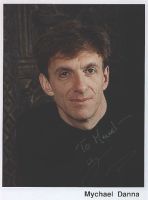 Last
March the 20th we were glad to finally talk to Mychael Danna in
an interview that lasted more than an hour. Here you have the second
part, where we talk about his partnership with Ang Lee, and specially
what happened with his rejected score for The Hulk. May you want
to remember the first part? Just press here. Last
March the 20th we were glad to finally talk to Mychael Danna in
an interview that lasted more than an hour. Here you have the second
part, where we talk about his partnership with Ang Lee, and specially
what happened with his rejected score for The Hulk. May you want
to remember the first part? Just press here.
BSOSpirit(BS): From Atom we move to Ang
Lee. How did he first get interested in your work?
Danna(D): I believe the way it worked is that I was in New York
working on Kamasutra, and I think we were working in the same
building where he was beginning to edit The Ice Storm, and
the music supervisor from that film walked by and heard some of the
music from Kamasutra and stuck his head into the edit room
and said: "Hey, what is that?" (Laughs). It's kind of funny, but that
is how I ended up meeting Ang, by accident....
BS: ...out of pure casualty...
D: Yeah, the right place the right time... (laughs). The Ice
Storm is incredibly powerful and it's not unlike Atom Egoyan's
in its tone and way of kind of unfolding the story, so it was definitely
familiar territory for me...dark and twisted....and...
BS: ...With very complex characters in very
complex situations...
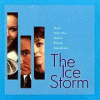 D: Exactly,
and extreme mixture of comedy and tragedy, and you know, human obsessions
and faults and it's a beautiful, beautiful film, and it was a joy
to work on it. The music of course is based on the exact opposite
of what's going on in the film, people in the film are turning back
on hundreds of thousands of years of human evolution and decided
to re-invent how human relate to each other within a few short years,
and of course that leads to disaster in the hands of nature. The
music is all about nature, it has North American native flute player... D: Exactly,
and extreme mixture of comedy and tragedy, and you know, human obsessions
and faults and it's a beautiful, beautiful film, and it was a joy
to work on it. The music of course is based on the exact opposite
of what's going on in the film, people in the film are turning back
on hundreds of thousands of years of human evolution and decided
to re-invent how human relate to each other within a few short years,
and of course that leads to disaster in the hands of nature. The
music is all about nature, it has North American native flute player...
BS: ...And the use of the gamelan...
D: Yeah, that was the purpose for that, just kind of create of
natural phenomenon.
BS: The regular CD edition of The Ice Storm did
only contain two tracks of your music in comparison with other times
where you get the whole bunch of your score, like in Girl Interrupted.
Are you glad with the CD editions that you're getting?
D: The Ice Storm CD in fact is out of print, and I'm actually
right now trying to negotiate a re-release of the score...
BS: ...Of the entire score?
D: ...Yeah, all the score will be available. Because of all the
films I've done I think it's one of the few where the full score is
not available, yet it's probably one of the most popular ones that
I have written...(laughs) I'm hoping to take care of that in the next
months...
BS: That'll be very well received news.
B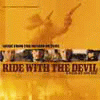 S: With the general idea of your music that the public usually have
(the moods and the ethnic instrumentation) when you came to the
point of composing Ride to the Devil people had no big hopes
set on you, and yet you come to write a very powerful score that
was neither Berstein nor Morricone (the two main figures
in what western music should sound). How did you face that project? S: With the general idea of your music that the public usually have
(the moods and the ethnic instrumentation) when you came to the
point of composing Ride to the Devil people had no big hopes
set on you, and yet you come to write a very powerful score that
was neither Berstein nor Morricone (the two main figures
in what western music should sound). How did you face that project?
D: Well I think you have to respect the past (in this case Elmer
Bernstein and Ennio Morricone, both masters of the genre)
and be aware of their work. But because it is an Ang Lee film
it has a great deal of introspection and detailed character development,
so that also has to be respected... And you know, I love to move from
one kind of music to another, so I love early music, and all kinds
of sorts of music other than the typical film music, and that also
is a challenge to, to work with a big orchestra in a western setting
and also use some folk instruments like banjo and some other early
instruments and mix it all in a large orchestral score. It was challenging,
but to be perfectly honest with you, an orchestral score is actually
much easier to write in a lot of ways than a multi-ethnic score. Those
kinds of score are very complicated and they may not work, that's
the worst part, it's very dangerous and a very big risk because we
all know that a big orchestra will work in a movie...
BS: And where do you find yourself more comfortable,
with a large orchestra, a small formation or travelling around the
world recording street musicians?
D: I love travelling around the world and record street musicians
(laughs), but that's the most dangerous thing to do, because as your
career develops you end up working on big projects, and the bigger
projects are less in going into that risk (in not knowing what they
are going to get), and there's so much control and the directors feel
that they need to have control over everything. They want to sit in
your studio as you write and they want to hear every note and have
an opinion on every note... That kind of extreme control leaves no
possibility of travelling around the world with a tape recording anymore.
Just because the of the kinds of film I've doing I've ended up with
orchestral scores more and more, because that way, the directors actually
have more control, they can hear in advance what is going to sound
like (listening to a synthesize mock up or an orchestral mock up).
I love working with orchestra, I've just came back from London where
I've recorded with the Philharmonic Orchestra de score for Vanity
Fair, and it's beautiful and powerful hearing a great orchestra
creating that gorgeous sound. And in a way, I won't say it's easier
but it's certainly less risky than writing an experiment (which I've
done). You know that is going to work and the producers and director
will be happy with an orchestral score.
BS: And that is related to the fact that in
general terms people tend to associate large orchestra with a large
and huge budget, and the opposite, a minor film cannot have a large
orchestra, it has to be a very little instrumentation that almost
cannot be heard and certainly doesn't have the role that music have
in a big budgeted film...
D: You're exactly right. People's expectations are very important
and it's fun to break their expectations. However, when there's a
lot of money at stake, it's unlikely you'll be allowed to do whatever
you want (laughs). When it's a $2 million film, everyone is ready
to explore and do something shocking and unexpected. On a $25 million
film, there's a lot less flexibility in people's minds. And when it's
a $100 million there's no flexibility at all (laughs). There are so
many people telling the composer what to do, that I think you can
found there the reason why so many big budget films have mediocre
scores. In my future and looking ahead I want to do things that are
new for me and new for listeners... Orchestral scores have been fun
because they were new for me for a while, but now they aren't new
for me anymore (laughs) and I'm starting to get bore of them...I don't
know where I'm going to end up next, I haven't decided yet...
BS: Well, you could always go to the Amazonian
jungle and record the wild beasts (laughs).
D: I'll love to do that (laughs).
BS: I was joking...
D: No seriously (laughs) if you find something where that would
work I'll do it for you (laughs).
BS: Okay, I have your word (laughs).
BS: Jokes apart. We now come to the point where The
Hulk is announced. Again when you're attached to the project
it's a general idea that you don't quite fit in a superhero movie
(which is bounded to the sounds of Williams or Elfman).
Suddenly you're move apart from the production and Danny Elfman comes
in. What was that really happened?
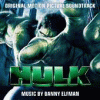 D: That
was such an unfortunate situation. I think Ang was making
a very unusual superhero movie and I was doing a very unusual score
for it (laughs). We had recorded Japanese taiko, African drumming,
Arabic singing we had all this really wild music and then we were
going to have a big orchestra as well, and I think the studio got
very, very nervous about having something so unusual on the screen
and having at the same time music so unusual. I think they just
basically panic, because again there's so much money at stake and
they were thinking that if "we're going to have such a weird movie
we better at least have something that the audience is comfortable
with, a score that we've heard a million times before and Danny
Elfman can write it". D: That
was such an unfortunate situation. I think Ang was making
a very unusual superhero movie and I was doing a very unusual score
for it (laughs). We had recorded Japanese taiko, African drumming,
Arabic singing we had all this really wild music and then we were
going to have a big orchestra as well, and I think the studio got
very, very nervous about having something so unusual on the screen
and having at the same time music so unusual. I think they just
basically panic, because again there's so much money at stake and
they were thinking that if "we're going to have such a weird movie
we better at least have something that the audience is comfortable
with, a score that we've heard a million times before and Danny
Elfman can write it".
BS: But that's very ironic, because I don't
know if you have heard Elfman's score, but it's exactly as
you describe what you were doing. It has the ethnic instrumentation,
a large percussion section of the orchestra, it has Arabic chorus,
and how can you be removed from a movie being told that your work
doesn't fit and they bring Elfman to do almost exactly what
you were doing??
D: Well, I know that's quite ironic. But they did leave some of
my music in the movie, so the Arabic singing and some of the drumming
is mine. What happened is that they panicked, they brought in Danny and
he heard what I've been doing and I guess he liked it (laughs)...
BS: ...I don't know if you have seen the movie.
D: Not all of it.
BS: Well, I remember a scene in particular
where the Hulk is carried on helicopter to the desert and
I remember having the feeling that the music I was hearing was not
from Elfman but from you...
D: It's the greatest form of compliment when someone copies you...(laughs).
That was a very unfortunate experience...and I don't know... I understand
the mechanics of what happened with so much money at stake and panic
all around.
BS: But that fact is getting to be very common
ground in Hollywood today. A composer is attached to a project and
a month or less before the film is released he gets fired and another
one gets his place with very little time to compose anything worth
the value. Why do you think that happens?
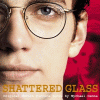 D: Well,
the amount of control over the composer has never been as strong
as it is now. Every single note is questioned; they want to hear
everything before something is given for good. In the old days the
composer would come and play something on the piano and told the
director that would be great for the orchestra, and he would believe
him because there was so much respect for the composer. Now they
want control over everything. They listen to the early sketches
and if they don't think it's going in the right way they fire him
and get someone else. Especially in movies that have problems, that
is very, very common. Right after I got fired of The Hulk I
ended up being hired on a movie were they have fired someone else,
on Shattered Glass with Hayden Christiansen. And it's
always best to be the second composer (laughs), because the first
one has already done most of the work, and now they're desperate
for anything good... From now on I'm only going to work in movies
when the first composer has been fired (laughs). D: Well,
the amount of control over the composer has never been as strong
as it is now. Every single note is questioned; they want to hear
everything before something is given for good. In the old days the
composer would come and play something on the piano and told the
director that would be great for the orchestra, and he would believe
him because there was so much respect for the composer. Now they
want control over everything. They listen to the early sketches
and if they don't think it's going in the right way they fire him
and get someone else. Especially in movies that have problems, that
is very, very common. Right after I got fired of The Hulk I
ended up being hired on a movie were they have fired someone else,
on Shattered Glass with Hayden Christiansen. And it's
always best to be the second composer (laughs), because the first
one has already done most of the work, and now they're desperate
for anything good... From now on I'm only going to work in movies
when the first composer has been fired (laughs).
BS: Well, leaving Ang behind, now we
want to talk about the various kinds of music and instrumentations
that you like to use in the most unexpected films. And what better
example than 8mm. How did you come with such an unusual score?
D: The movie 8mm was about a detective who gets drawn into
this world of pornography and he knows nothing about it, and gets
pulled deeper and deeper into it. And I wanted to symbolize that by
having the music go into a place that is uncomfortable for people.
Moroccan music has this otherworldly quality of pulling you deeper...
I mean it's very simple most of the pieces speed up, technically they
get faster and faster as the rhythms go and repeat and repeat and
it's very hypnotizing and it pulls you and drives you in. So this
quality of music just seemed so perfectly for the theme of the film.
Luckily I was working with the director and it was a fairly big budget
movie but Joel Schumacher was very an art film director and
he basically respected me enough to just say: "Hey, if you think that's
the right thing go and do it". It was wonderful, unlike many other
studio projects where you have to play the music for everybody, Joel basically
just said "do whatever you want, evolve, do something shocking"...
So I did (laughs). It was great and I think it turned out very well
although I think the people at the studio were very upset when they
heard it...
B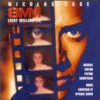 S: ...Well, the impression I got when I first saw the movie was that
the music fitted perfectly tha images it back grounded... S: ...Well, the impression I got when I first saw the movie was that
the music fitted perfectly tha images it back grounded...
D: That's what I intended to do, but a lot of time with studio's
films they want the safer and more comfortable, being the music the
source of this comfort and predictability to the audience. That seems
to be a constant from the music departments of the bigger studios.
I have work with Sony since then, and they're lovely people
and what I'm saying it's not against them, it's just the fact that
this attitude seems to be part of the culture. Music needs to be safe
and comforting to the audience. But I think that has change in the
last few years, because I was one of the only ones doing that sort
of thing six or seven years ago; now it's fairly common...
BS: Yeah, it's starting to be a sort of common
ground to composers to get of the main line and into the experimentation...
D: I have some credit in that and now I'm looking for something
different (laughs)...
BS: If we speak in six or seven years perhaps
you would tell me the same about what you're doing now (laughs)...
D: (laughs) I think it's wonderful because there have been great
works in the last few years and I'm glad that maybe I was part of
that.
BS: You sure were...
D: Thanks (laughs).
BS: And I think this has to do again with the
topics in music and breaking them. I mean, you have a movie set
in Ireland you have the bagpipes, you have a movie in India you
have to have the sitar... And the Danna sound seems to be
always moving apart from these "cliches" creating new ones...
D: Yeah, and sometimes people is very inaccurate into how to portrait
different cultures musically. Normally they're poorly studied and
poorly understood and in a world so small where we are aware of each
other we should be able to respect and understand cultures and portray
them correctly and with more than a cliche, superficial...
BS: Yeah, like representing Spain with the
bullfighting and flamenco...
D: ... Yeah, that's the easy thing if you don't think at all. If
you don't research further you won't be able to see there's a rich
world in music and culture that's inherent to every single country
in this world...
BS: But how can you mix those two sides of
popular music: from one face the ethnic and folkloric music and
on the other the value that you can give it as film music?
D: It's difficult, because the first purpose of film music is to
help the film say what it's trying to say and help the director to
communicate the theme and his concepts to people and how these concepts
reflect in the music. So that's the first goal of film music and you
must do that first. If you're able to expand on that and bring on
other ideas that could make people think deeply, then you'll succeed
in a way that is difficult to reach. It's more difficult and more
complicated to, you know, if you're bringing 15th Century European
music into a film you still have to be able to get across the emotions
that the director needs to get across, and it becomes doubly complicated
because you, not only have to understand this music (which is not
typically film music) but you have to use it in a way that reaches
the goals that need to be accomplished...
BS: That was exactly what my question was referring
to...
D: I can tell you that this is much more complicated that bring
in a large orchestra and letting them play. And because every single
film is different you have to solve it and hopefully with the director
working with you and not against you (laughs). But at the same time
that fact is what makes wonderful working in film music every time
that you begin a new project you wipe your past experiences. I have
just finished Vanity Fair and I've been writing music based
on Mozart and Beethoven for a full orchestra, and the
next thing I'll do (I don't know what it'll be) but it won't be that
and I love that (laughs).
BS: An example of your versatility and what
we have been talking is Monsoon Wedding in where you mixed
Indian music with piano and orchestra...
D: Yeah, of that particular culture I have a lot of understanding...
I had an Indian wedding (laughs) and that was reflected into what
I composed for the film.
BS: Well, taking our conversation into another
direction...lately you could say that Hollywood has an eye on you
in composing dramas. What do you think they love about your style?
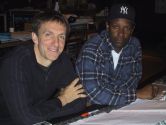 D: Ah
(laughs), I could make... I think a real aspect of Hollywood that's
been there throughout the history is that they are aware of different
talents around the world and they love to have the most interesting
people coming into their town and work for them. The irony is that
once they get you there they want you to do exactly what they are
doing (laughs), so you have to stop doing whatever you were doing
that attracted them in the first place. That's an exaggeration,
but that's certainly something that happens. I think that, of all
the work that I've done, people tend to call me about the respect
that my work usually have with people's emotions, that my music
doesn't pound them on the head with the obvious, and I think that's
one of the reasons that I first was hired by Denzel Washington to
write the music for Antwone Fisher, because he loved the
music for Girl Interrupted. He liked the fact that the music
was just, you know, not typical big Hollywood music overdriving
every scene, but a gentle music that was very subtle... D: Ah
(laughs), I could make... I think a real aspect of Hollywood that's
been there throughout the history is that they are aware of different
talents around the world and they love to have the most interesting
people coming into their town and work for them. The irony is that
once they get you there they want you to do exactly what they are
doing (laughs), so you have to stop doing whatever you were doing
that attracted them in the first place. That's an exaggeration,
but that's certainly something that happens. I think that, of all
the work that I've done, people tend to call me about the respect
that my work usually have with people's emotions, that my music
doesn't pound them on the head with the obvious, and I think that's
one of the reasons that I first was hired by Denzel Washington to
write the music for Antwone Fisher, because he loved the
music for Girl Interrupted. He liked the fact that the music
was just, you know, not typical big Hollywood music overdriving
every scene, but a gentle music that was very subtle...
BS:... That's the impression you get listening
to the Antwone Fisher score without having seen the movie...
D: Yeah, and I think some directors are attracted to that and that's
a new development in film music. People are better and better educated,
not only in America but in every place, and they don't need the music
to tell them what they're already seeing. Specially in films where
people are thinking for themselves (laughs) and they don't want the
music screaming "THESE PEOPLE ARE IN LOVE!!" or "THESE PEOPLE ARE
ANGRY!!" (laughs). They want music to take a step further and to say
something else and more subtle. And I think that's why people love
my work for Girl Interrupted, because the subtlety of it and
why I'm more called to do this kind of music that the multi-ethnic,
multi-historic that I used to do.
BS: And how was the experience of working with Denzel
Washington, being Antwone Fisher his first time directing?
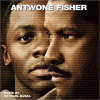 D: It
was a great experience. He's a very smart man, and although this
is his first film directing, he has been acting in films for twenty
years and in doing so he has come with a very profound understanding
in films and in acting, and he uses that understanding to tell you,
composer, what to do in scoring as in acting. So he will always
had something very profound to say, something with very hindsight
and his acting was very much like what he wanted in music. He likes
the motto "Less is More" and he would say it all the time and from
time to time he would do a scene for me where he would tell me "Okay Mychael,
what do you find more frightening this (and he started screaming
at me) or this (and he would just stare at me telling me that everything
is going to be okay...)?. And I can assure you that the second one
put chills down my spine and he scared the hell out of me (laughs).
It was his way of approaching the music by thinking of how he would
direct the scene, that I found more inspiring. And I think the film
turned out very well and hope that he does another one and counts
me in (laughs). D: It
was a great experience. He's a very smart man, and although this
is his first film directing, he has been acting in films for twenty
years and in doing so he has come with a very profound understanding
in films and in acting, and he uses that understanding to tell you,
composer, what to do in scoring as in acting. So he will always
had something very profound to say, something with very hindsight
and his acting was very much like what he wanted in music. He likes
the motto "Less is More" and he would say it all the time and from
time to time he would do a scene for me where he would tell me "Okay Mychael,
what do you find more frightening this (and he started screaming
at me) or this (and he would just stare at me telling me that everything
is going to be okay...)?. And I can assure you that the second one
put chills down my spine and he scared the hell out of me (laughs).
It was his way of approaching the music by thinking of how he would
direct the scene, that I found more inspiring. And I think the film
turned out very well and hope that he does another one and counts
me in (laughs).
BS: Well, we're near the end of our interview.
I'd like to have a few impressions about your two Celtic albums
with your brother (A Celtic Tale and A Celtic Romance)
which I specially love. I think the first one is one of your greatest
work, and people love them too!
D: Thanks (laughs).
BS: Are there any plans of continuing these
collaborations with your brother? And what exactly is yours and
what is your brother's?
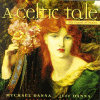 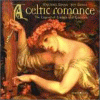 D: Basically
in those albums we worked with a friend of us and he wrote the stories
and we would come up with the music in what was much like writing
film music but to a story instead of a film. We split themes but
at the same time we were working together and it's hard to say what
did who. Usually the themes that are sadder are mine (laughs)... D: Basically
in those albums we worked with a friend of us and he wrote the stories
and we would come up with the music in what was much like writing
film music but to a story instead of a film. We split themes but
at the same time we were working together and it's hard to say what
did who. Usually the themes that are sadder are mine (laughs)...
BS: (laughs)... So the battle scene in A
Celtic Tale is Jeff's?
D: No, that one I wrote because it was about death and that was
my department (laughs). And as far as if we'll work together again,
well, I'm moving to Los Angeles next week...
BS: Are you scared? Because seeing Bowling
for Columbine it mustn't be an easy choice to do that move.
D: I'm scared but not exactly for that reason. I'm scared of what
it'll do to my music. But I've been married now for two years and
I travel so much that I'm away from home so much... So that's actually
the reason of moving out, to be at home. And I think that if we were
to move to Hollywood that would be horrible, because have you ever
been to Los Angeles?
BS: No.
D: Well, Hollywood is actually kind of an awful neighbourhood full
of poor people, and is actually kind of dangerous, but it has this
powerful character that comes from mixing the great character of the
old Hollywood "grandeur" with the sights of broken down shops and
horrible places... So I kinda like it (laughs).
BS: (laughs) ... You're going to feel like
home... And will find your inspiration in the lowest neighbourhoods
of Los Angeles.
D: Well, otherwise there are no places for me to find any inspiration
there, because is all boring and money... And this part of it can
be thought as a different culture... And yeah, I'm worried about what'll
do to my work, and I guess we'll find out.
And the good thing is that I'll be living near my brother and we've
talking of getting a studio together and work again together...
By the way, have you heard his Gospel of John??
BS: Not yet, but surely have the intention
to...
D: That is a beautiful score. He is a great melody writer and that's
a gorgeous example. I think it's a great piece of work.
BS: Then I'll listen to it; I'll take your
recommendation...
D: And that's my future, I'm moving to Los Angeles and don't know
what will happen there...
BS: So moving to Los Angeles will mean that Atom and
you will have no more projects or have you already a project together?
D: There's a project for which I have a script, and I'm sure we
will work together. It's probably a year from now.
BS: Well I think that's a wrap.
D: Oh, it's been a pleasure talking with you.
BS: I can tell you, the pleasure has been entirely
mine. I think that the person who contacted you in the first place
will tell you when the interview is on the web, so you can see it
and remember the few laughs that we have had in this hour of talking.
D: Very nice speaking with you and for calling, and I'll surely
have a look into it. This will be in Spanish, I guess?
BS: No, the interview will be both in English
and in Spanish, so we can reach a wider range of readers.
D: I see. All the best for you and the best of luck for your web.
BS: Best regards from Spain, Mychael,
bye.
D: Bye.
BySergio Benítez and Rubén
Sánchez
|



 Last
March the 20th we were glad to finally talk to Mychael Danna in
an interview that lasted more than an hour. Here you have the second
part, where we talk about his partnership with Ang Lee, and specially
what happened with his rejected score for The Hulk. May you want
to remember the first part? Just press here.
Last
March the 20th we were glad to finally talk to Mychael Danna in
an interview that lasted more than an hour. Here you have the second
part, where we talk about his partnership with Ang Lee, and specially
what happened with his rejected score for The Hulk. May you want
to remember the first part? Just press here.

 S: With the general idea of your music that the public usually have
(the moods and the ethnic instrumentation) when you came to the
point of composing Ride to the Devil people had no big hopes
set on you, and yet you come to write a very powerful score that
was neither Berstein nor Morricone (the two main figures
in what western music should sound). How did you face that project?
S: With the general idea of your music that the public usually have
(the moods and the ethnic instrumentation) when you came to the
point of composing Ride to the Devil people had no big hopes
set on you, and yet you come to write a very powerful score that
was neither Berstein nor Morricone (the two main figures
in what western music should sound). How did you face that project? 

 S: ...Well, the impression I got when I first saw the movie was that
the music fitted perfectly tha images it back grounded...
S: ...Well, the impression I got when I first saw the movie was that
the music fitted perfectly tha images it back grounded... 


